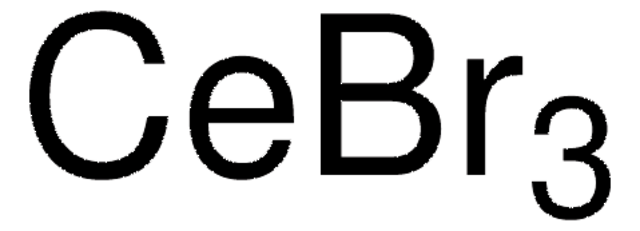429465
Lithium bromide
AnhydroBeads™, −10 mesh, 99.999% trace metals basis
Synonym(s):
Lithium monobromide
About This Item
Recommended Products
product line
AnhydroBeads™
Quality Level
Assay
99.999% trace metals basis
form
beads
impurities
≤15.0 ppm Trace Metal Analysis
particle size
−10 mesh
mp
550 °C (lit.)
SMILES string
[Li+].[Br-]
InChI
1S/BrH.Li/h1H;/q;+1/p-1
InChI key
AMXOYNBUYSYVKV-UHFFFAOYSA-M
Looking for similar products? Visit Product Comparison Guide
General description
Application
- An electrolyte additive for lithium-sulfur batteries to enhance their rate performance and cycling stability.
- To prepare poly (vinyl alcohol) (PVA) fibers. The addition of LiBr improves the mechanical properties of the polymer fibers.
- To fabricate a surface passivation layer for silicon solar cells to enhance photoluminescence intensity.
Legal Information
accessory
Signal Word
Warning
Hazard Statements
Precautionary Statements
Hazard Classifications
Acute Tox. 4 Oral - Eye Irrit. 2 - Skin Irrit. 2 - Skin Sens. 1
Storage Class Code
13 - Non Combustible Solids
WGK
WGK 1
Flash Point(F)
Not applicable
Flash Point(C)
Not applicable
Choose from one of the most recent versions:
Certificates of Analysis (COA)
Don't see the Right Version?
If you require a particular version, you can look up a specific certificate by the Lot or Batch number.
Already Own This Product?
Find documentation for the products that you have recently purchased in the Document Library.
Customers Also Viewed
Articles
Solid-state lithium fast-ion conductors are crucial for safer, high-energy-density all-solid-state batteries, addressing conventional battery limitations.
Solid-state lithium fast-ion conductors are crucial for safer, high-energy-density all-solid-state batteries, addressing conventional battery limitations.
Solid-state lithium fast-ion conductors are crucial for safer, high-energy-density all-solid-state batteries, addressing conventional battery limitations.
Solid-state lithium fast-ion conductors are crucial for safer, high-energy-density all-solid-state batteries, addressing conventional battery limitations.
Our team of scientists has experience in all areas of research including Life Science, Material Science, Chemical Synthesis, Chromatography, Analytical and many others.
Contact Technical Service









